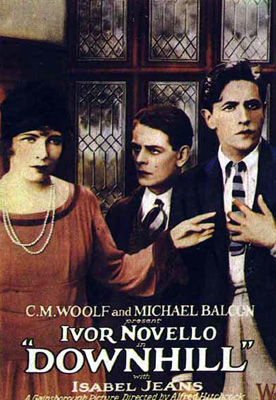
DOWNHILL
UK, 1927, 80 minutes, Black and white.
Ivor Novello, Robin Irvine, Isabel Jeans, Ian Hunter.
Directed by Alfred Hitchcock.
Downhill was made immediately after The Lodger, also starring Ivor Novello, based on stories about Jack the Ripper. It became something of a classic. Downhill was not as popular as The Lodger but is a very interesting example of early Hitchcock film-making. The variety of his shots, the piecing of them together by the editing, the storyboarding all indicate the craft and techniques that Hitchcock was to use to great effect throughout his long career. It could serve almost as a textbook for studying Hitchcock.
The film begins in a public school, Ivor Novello playing Roddy Berwick who becomes school captain. However, he and his friend who is on a scholarship, spend some time with one of the servants and she accuses them of making her pregnant. The scholarship boy is to blame but is frightened of losing his scholarship. Roddy takes the blame and is expelled, alienated from his father. His life goes downhill. He works as a waiter, then as a dance partner gigolo in an establishment in France. He goes right down, people taking pity on him and shipping him back to England where he is reconciled with his father and the truth told.
Ivor Novello, who appeared in The Lodger, was a celebrated playwright and wrote this play. He was also a significant composer (portrayed by Jeremy Northam in Gosford Park). The play was co-written by actress Constance Collier. The screenplay was written by Eliot Stannard, the regular writer of early Hitchcock films.
1.Storytelling in 1927? The end of the silent era? Silent film storytelling, performance, body language, the lack of dialogue?
2.The black and white photography, the public schools, the location photography, interiors and exteriors? Mansions? Restaurants? Dancing establishments? Authentic atmosphere?
3.The title, indication of the theme, Roddy’s life?
4.The opening, the rugby match, the masters, the parents, the boys, Roddy as hero? The celebration in the dining room? His friendship with Tim? Tim and his scholarship?
5.The serving girl, flirting, the note to Tim? His taking Roddy? Dancing with the girl in the shop? Her later coming to the principal, accusations against the boys? Roddy taking the blame?
6.Roddy and his character, friendship with Tim, Tim allowing him to take the blame? Roddy and the expulsion, returning home, the angry reaction of his father? His mother’s grief?
7.Roddy and his life as a waiter, the encounters with different people, dancing partners, the woman in charge, the poet and her watching him, getting him to tell his story? The background of his marriage, with the young woman, her deception, the flat in his name, his losing his legacy?
8.The return home, the techniques used for his hallucinations in his illness, imagining his father, the gramophone record, the superimpositions?
9.His return home, his mother, his father asking forgiveness, knowing the truth?
10.A 1920s morality tale?